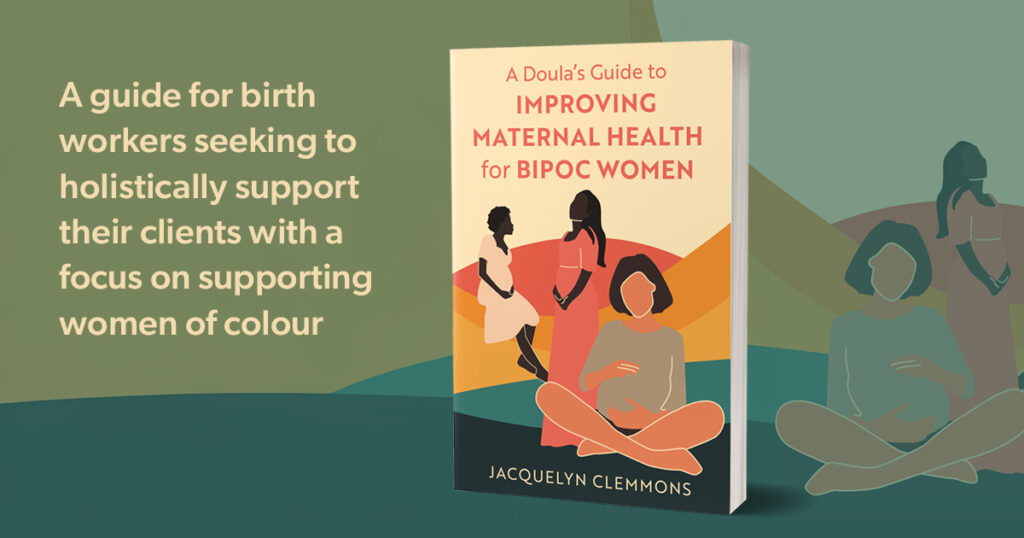Beyond Credentials – An Excerpt from A Doula’s Guide to Maternal Health for BIPOC Women

This blog post is an excerpt from Chapter 3: Beyond Credentials from A Doula’s Guide to Maternal Health for BIPOC Women by Jacquelyn Clemmons.
PAPER QUALIFICATIONS ARE NOT EVERYTHING
I don’t know about you, but in the world, I’ve grown up in, it seems like credentials, degrees, and all kinds of accolades get dangled before us as the ultimate prize. If we’re not careful, we may inappropriately bring that mindset into areas of our life. How our minds connect to achievement could possibly be barriers to comprehensive care.
What good is a degree or certificate if you can’t listen and connect with the people you serve and support? When we listen in about the Black maternal health crisis, not only in the United States but worldwide, one of the main challenges is that patients, people, and clients are not being listened to. Their complaints are not being heard. They’re being dismissed when they share what type of symptoms they’re experiencing.
Even in the history of the US of gynecological care, when it was first established, it was said that Black women didn’t feel pain, so they were experimented on, poked, prodded, and cut open without adequate pain relief and without their consent; and all of this was being done by folks who held degrees and certificates.
So, I want you to walk with me here, as we ponder what our personal connection is, to degrees, credentials, certificates, whatever it is. While it is of the utmost importance to be well-rounded and trained, your certificates, credentials, and degrees do not supersede the level of holistic care you should be able to provide. I want you to answer a couple of these questions before we move forward:
- Does having a degree make you feel like you are the authority in any space you’re in?
- Does having a particular credential make you feel you are better than another person?
- Do you rely on your degree to give you permission to not listen to information that is being presented to you in the moment?
If you answered yes to any of those questions, let this be a moment of self-reflection that you take. Have you considered that information, research, and understanding of many different topics is ever evolving
and that when you have received your degree, there might be a whole host of new information discovered?
When supporting Black families and birth, it is extremely important not to slip into the “savior complex” or any other dismissive role. As a doula supporting Black families, it is important that you understand
that you are there to empower, affirm, educate, and advocate. You are there to learn about the people before you and support and affirm them accordingly.
While your training and the information you have learned are invaluable assets to your journey overall, they cannot be used to dismiss someone else’s literal experiences, background, history, and knowledge of self.
The history of the savior complex, as it relates to Black families, is pervasive in many industries. Whether it is religious colonizing, the history of gynecology, or the wisdom of the grand midwives being co-opted and becoming the foundation of modern-day midwifery in the West, the basis of all of these instances is the following thought.
The idea that “I know better than you because I have this credential degree background, and so, now, whether I’ve gotten the information from you or not, I’m going to feed it back to you, and you have to
certify you can jump through this hoop or that hoop to prove to me that you are equal and on par.” Which is not always correct.
It’s also important to be mindful of prejudices and judgments that we have around credentialing, especially when it comes to communities of different ethnicities. We view credentialing degrees and certificates differently. That is a history lesson for a different day, but I will share this. There are certain communities, particularly, Asian or Eurocentric communities, that place an extremely high value on credentialing as a status symbol. Whether the knowledge that was shared and acquired in that credentialing was comprehensive or not, just having that piece of paper is something that is held high.
Whereas, lots of communities, Latino, African, and otherwise, are typically communal by nature and share information, and have shared information historically, via oral tradition. So, there’s also the understanding that having a degree, or knowledge from a degree, doesn’t make something true, and having something passed down as oral tradition or communal knowledge does not make that information false or inadequate.
A Doula’s Guide to Maternal Health for BIPOC Women by Jacquelyn Clemmons is out now. Click here to head to the JKP Website to learn more.